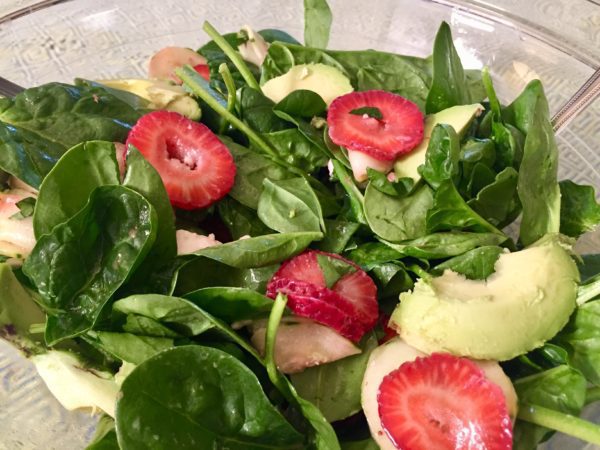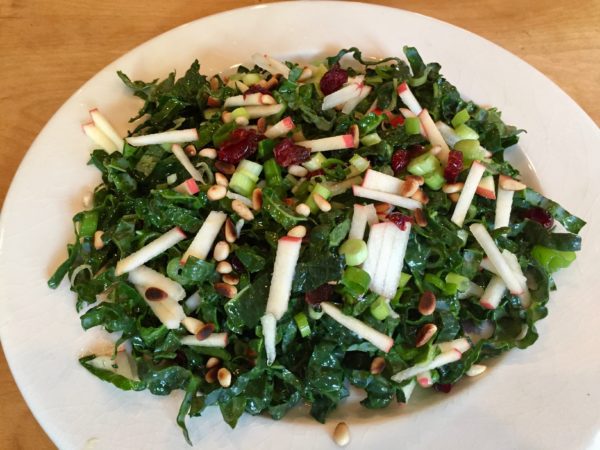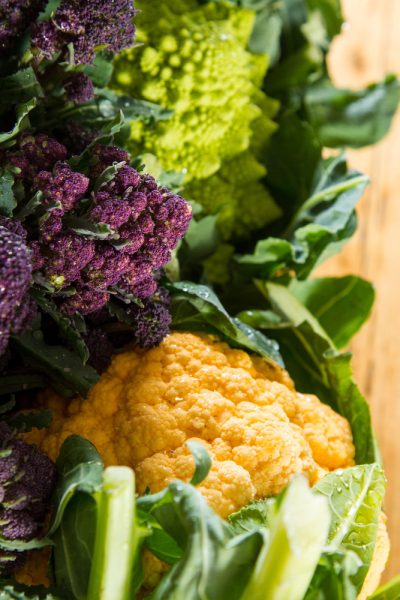Eating leafy greens regularly is one of the most powerful ways to care for your mental fitness, brain and physical health. They are a rich source of B vitamins, linked with better mental functioning and keeping your brain healthier and sharper as you age. They contain vitamin K which has been shown to boost memory, and phytochemicals that protect neurons from damage caused by oxidative stress. Loaded with immune protective micronutrients, leafy greens also:
- reduce inflammation (high brain inflammation is part of depression and anxiety)
- improve your immune system’s resistance to viral and bacterial infection
- work together to enhance defenses against destructive toxins
- detoxify and remove carcinogenic compounds from your body
[su_expanding_quote_book alignment=”full” source_author=”Leslie Korn, MD” source_title=”Nutrition Essentials for Mental Health” full_quote=”Green plants are rich in chlorophyll, the green color of plants that helps to clean and build blood. It inhibits bacterial growth, yeasts and fungi in the digestive tract, purifying the body of toxins. It is anti-inflammatory and helps to renew cells and support healthy gut bacteria. It is an energizing food important to people with fatigue-related conditions, depression and IBS (inflammatory bowel syndrome” short_quote=”Green plants are rich in chlorophyll. It is an energizing food important to people with fatigue-related conditions, depression and inflammatory bowel syndrome”]

Varieties
Did you know there are at least 18 different varieties of lettuce? Leafy greens also include:
- Arugula
- Beet greens – cut thin like coleslaw and add to salads, add to soups and chili or stir-fry
- Collard greens – you can use as a wrap instead or tortilla
- Escarole
- Kale
- Mustard greens – add to omelets and frittatas, bean dishes and stir fry
- Radicchio
- Sorrel
- Spinach
- Swiss chard
- Turnip greens
[su_expanding_quote_book alignment=”full” source_author=”Dean Sherzai, MD, PhD and Ayesha Sherzai, MD, MAS” source_title=”The Alzheimer’s Solution” full_quote=”When you want more bang for your nutritional buck, eat your greens. Greens are one of the most nutrient-dense foods in the world; that is, they are high in nutrients and low in calories. They pack so much in: phytochemicals, vitamins, minerals, fibers, good carbohydrates, even protein. Almost all studies done on brain health and nutrition show that the foods that stand out for people who have the best brain health and general health are greens. It’s always greens.” short_quote=”Studies on brain health and nutrition show that the foods that stand out for people who have the best brain health and general health are greens”]
Kale is packed with
- 45 different varieties of protective antioxidant flavonoids
- vitamin A which can improve learning skills
- mood-elevating vitamin C
- vitamin K which boosts memory
- essential minerals that protect against cognitive decline

[su_expanding_quote_book alignment=”full” source_author=”Rebecca Katz” source_title=”The Healthy Mind Cookbook” full_quote=”Swiss chard is agreat source of memory-boosting vitamin K. It’s also loaded with vitamin A, which has been linked with improvements in various learning skills. The array of B vitamins here, including folate and B6, may help keep the brain healthier and sharper as we age. Swiss chard also contains the minerals iron and zinc. Avoiding iron deficiencies is critical to avoiding cognitive complications in life. And zinc boosts our memories and may help keep depression at bay.” short_quote=”The array of B vitamins may help keep the brain healthier and sharper as we age.”]
Cruciferous vegetables

[su_expanding_quote_book alignment=”full” source_author=”Rebecca Katz” source_title=”The Healthy Mind Cookbook” full_quote=”Broccoli has B vitamins in abundance which is linked with better mental functioning, and as we get older, the prevention of dementia. Cabbages are especially powerful brain foods. Red cabbages have antioxidant phytochemicals that protect neurons from damage caused by oxidative stress. Cauliflower is a great source of vitamin C which is good not only for overall health of your brain but may elevate your mood. Kale is packed with 45 different varieties of antioxidant phytochemicals and mood-elevating vitamin C. ” short_quote=”Broccoli has B vitamins in abundance…”]
These are in the same nutrient dense leafy greens category. The name comes from the flowers, with four equally spaced petals in the shape of a cross. They have antioxidant phytochemicals that protect neurons from damage caused by oxidative stress. And lots of memory-boosting vitamin K. Cruciferous vegetables include:
- Bok choy
- Broccoli
- Brussels sprouts
- Cabbage
- Cauliflower
- Collards
- Kale
- Kohlrabi
- Mustard greens
- Turnip greens
- Watercress
What to Do?
Leafy greens are very versatile. Enjoy them in salads, soups and stews, or stir fries. Blend them into pesto and serve over fish or chicken, pasta or roasted vegetables. Add them to smoothies, blender muffins and pancakes.
- Choose different types of lettuce each week
- Mix and match leafy greens and cruciferous vegetables. Try different colored cauliflowers.
- Discover new greens you have not eaten before. Which one will do you choose this week?



